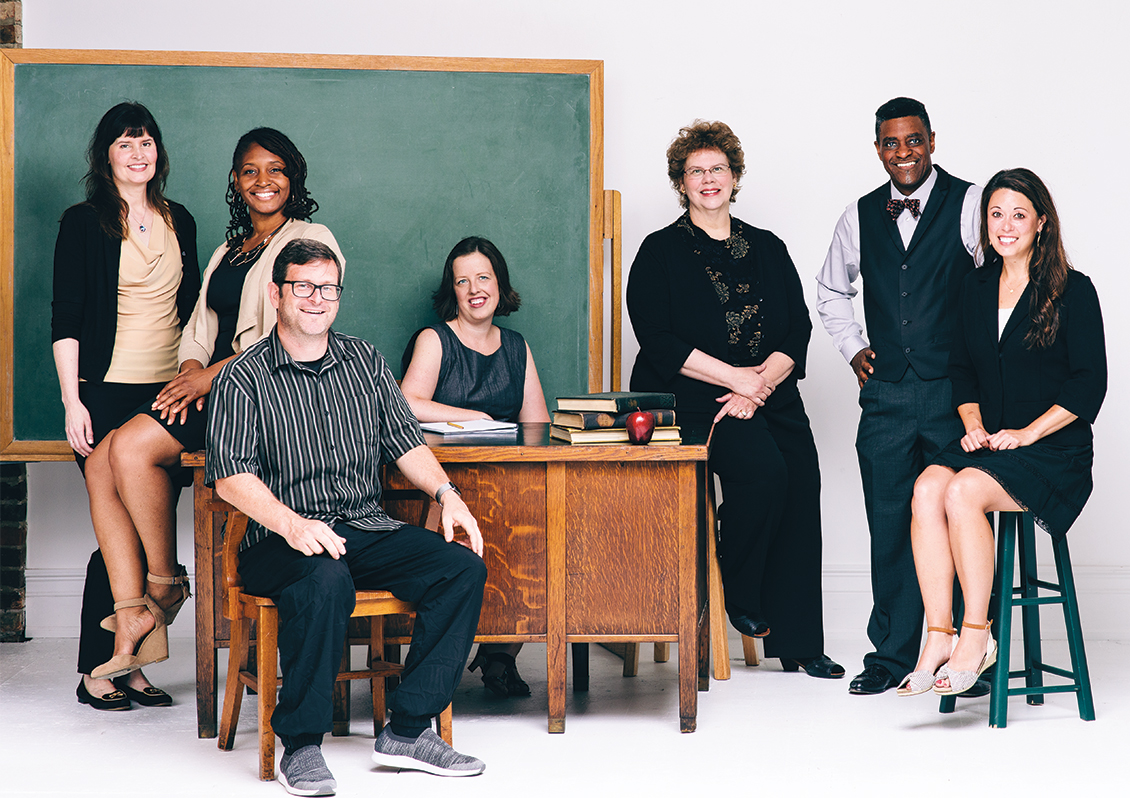Our Teaching Best
Honoring the teaching award winners from HHS
Story by William Meiners, photos by Brian Powell
Even at a 150-year-old land-grant university known for its world-class research, the transfer of knowledge from professor to students is pivotal to Purdue’s three-fold mission of discovery, learning and engagement. Though technology has modified the delivery methods, successful teaching today echoes the learning experiences from the late 1800s. Those “light bulb moments,” then a decade before Thomas Edison patented his light bulb, have helped students make giant leaps within their education.
Purdue has long honored the best teachers on campus. That recognition, says Thomas Berndt, HHS senior associate dean for academic affairs and administration, has dual purposes: to honor the winners and showcase them as examples to their peers. “The college and the university value teaching, as well as these excellent teachers,” he says. “The awards also encourage other HHS faculty to reach the same level of accomplishment.”
The following profiles highlight seven award winners from the College of Health and Human Sciences whose teaching innovations and prowess have inspired students who, in turn, will leave successful footprints in a variety of fields.
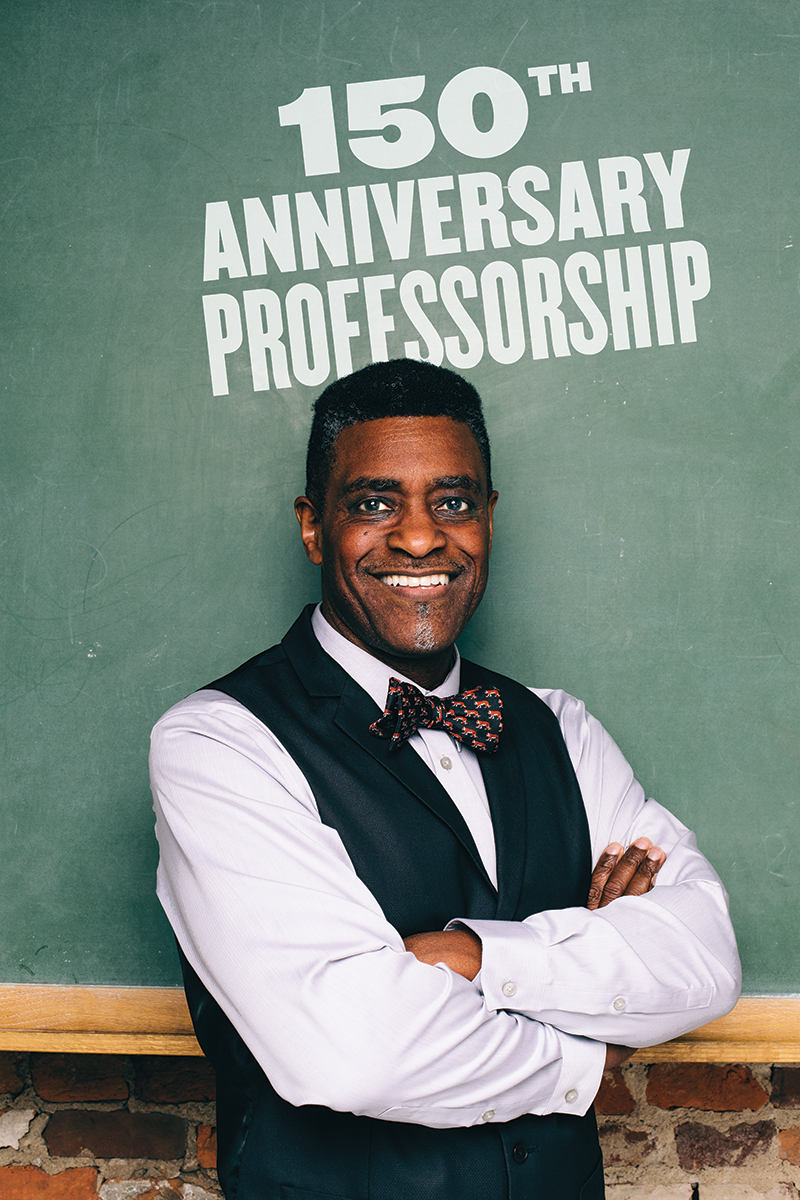
150th Anniversary Professorship
Born and raised in Brooklyn, New York, David Rollock says he was always the kid that other kids told their problems to. That sympathetic ear, an academic curiosity and an infectious personality served him well through high school and Ivy League educations at Princeton and Yale, where he earned his undergraduate degree and PhD, respectively.
Rollock, department head and professor of psychological sciences, recalls reading a high school textbook that suggested the IQ performance of African-Americans and other underrepresented minorities was lower than the average American score. “That did not square at all with my personal experience, so I figured there was something not quite right about how they were collecting or sharing their data,” he says. “I decided I wanted to be part of the enterprise that dealt with generating new information and framing it in ways to both inform the profession and help make lives better.”
As part of that research and teaching enterprise at Purdue since 1988, Rollock has earned numerous teaching awards. He was among 10 faculty members across campus awarded 150th Anniversary Professorships. The named professorship recognizes teaching excellence, as well as a history of outstanding mentoring.
In characterizing his own teaching philosophy, Rollock believes it’s his job to help people connect with the material. “That means deploying multiple techniques to meet multiple learners where their preferred styles of learning might be,” he says. “Sometimes I lecture because, similar to many faculty colleagues, I like to be a ‘sage on a stage.’ But we also need interactive demonstrations, places where students actively see the processes they’re learning about.”
Rollock also has transitioned happily into a mentorship role, having served as chair of the University’s Teaching Academy and becoming a tireless advocate of instructional excellence. Still, it’s hard to beat that exchange with students. “Teaching keeps one on one’s toes,” he says. “It forces us to be clear, as well as thoughtful.
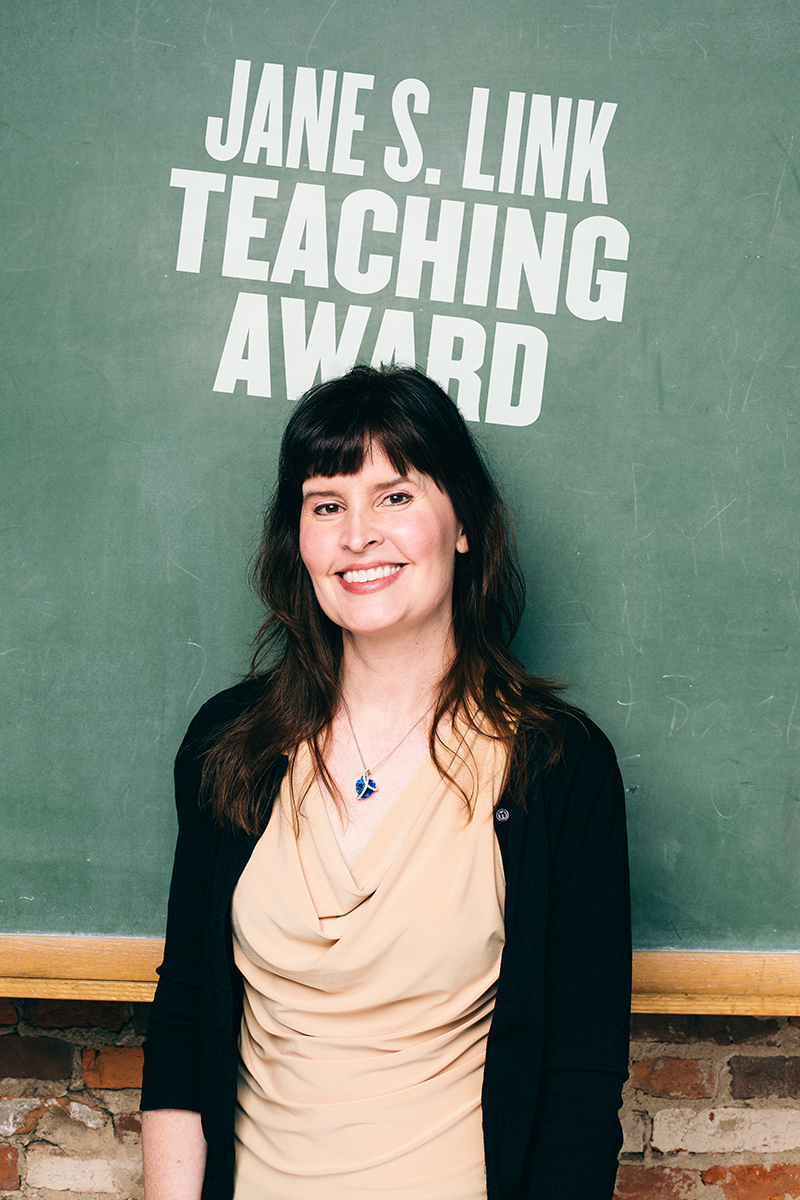
Jane S. Link Teaching Award
From research labs to various engagement opportunities, professors can share their expertise in various settings. Julia Chester, associate professor of psychological sciences, first fell for teaching in the context of mentoring in the laboratory. The love of classroom teaching, she says, came later.
Like many professors, she’s taught the gamut of courses at Purdue since arriving on campus in 2003. From packed lecture halls with 400 students learning introductory psychology to the relatively more intimate settings in classrooms about half that size, Chester learned to work the big room. When she had the chance to develop some courses around her own expertise, including Alcohol Use and Disorders, as well as an undergraduate course focused on research ethics, she found her groove.
In those settings, her discussion-based exercises fuel an interactive atmosphere. “I like best hearing what the students have to say,” Chester says. “I ask them to do a reflection at the end of a lecture, which could be a question or comment. It’s always fascinating what they have to say, and I learn a lot from them.”
As for what she would like her students to learn, Chester hopes it’s less about “what they need to know for the exam” and more about becoming a critical thinker for the rest of their lives. “I don’t care if you remember that 20 percent of students who enter college already have an alcohol use disorder,” she says. “What matters is that you can take a piece of information from a valid scientific source and also be able to evaluate all the information coming at you from various media outlets.”
Additionally, Chester believes that an open-minded disposition creates better classroom dynamics, especially within the psychological sciences. “Part of my mission is to reduce the stigma of mental illness,” she says. “We talk about that a lot in class. Hopefully, that’s something they can use in real-world situations.”
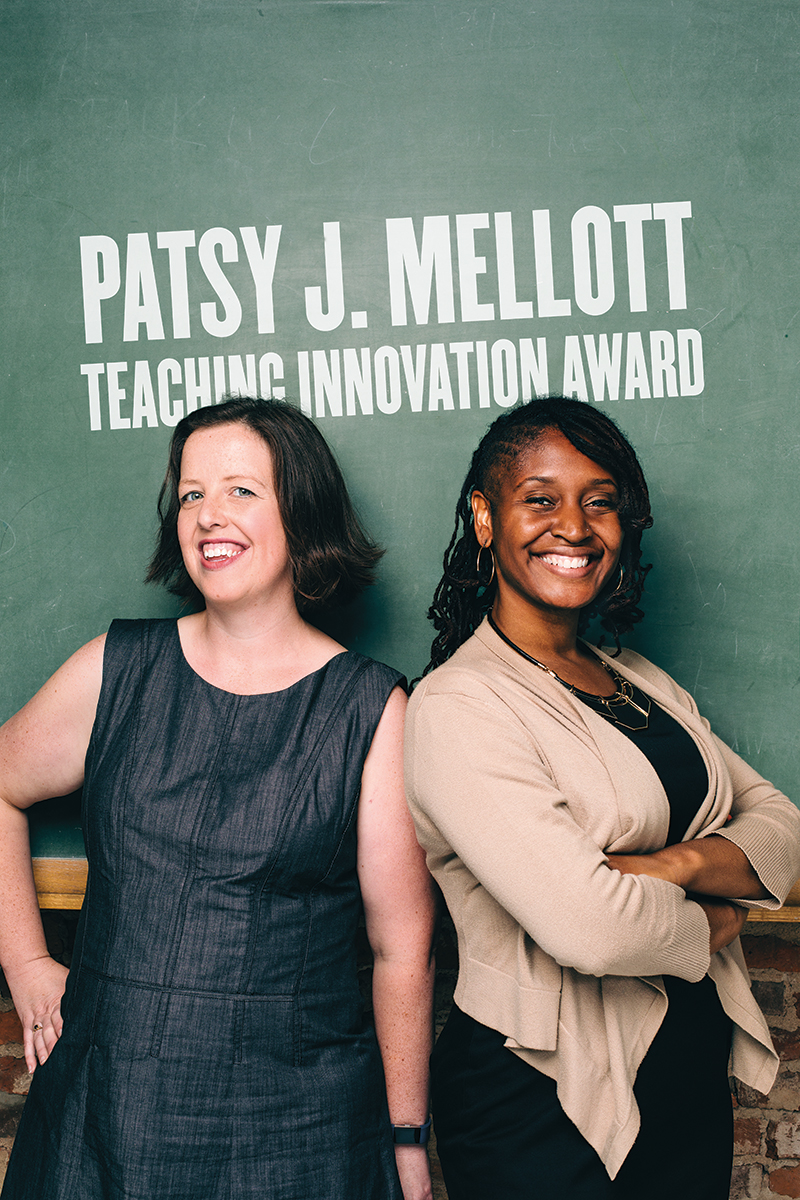
Patsy J. Mellott Teaching Innovation Award
Often in the world of higher education, two minds are better than one. Such was the case with the recent winners of the Patsy J. Mellott Teaching Innovation Award.
Jennifer Dobbs-Oates (PSY ’00), a clinical associate professor in human development and family studies, and Natasha Watkins, a clinical assistant professor in human development and family studies, are using award funds to develop best-practice training videos for site supervisors working with students participating in internships.
Perhaps not surprisingly, both Watkins and Dobbs-Oates gravitated to a field focused on relationships because of their own youth experiences. A self-described “military brat,” Watkins participated in summer youth programs as a way to integrate into new communities. After enrolling in a child psychology class as a Purdue freshman, Dobbs-Oates discovered that she could study the subject forever.
Clinical faculty members, Dobbs-Oates and Watkins have coordinated and overhauled their department’s undergraduate internship program for the last six years. Students in their junior and senior years take critical steps toward the working world through internships in social services, such as the Department of Child Services. The training videos not only will help provide better experiences for the student interns but also could bolster the skills of less experienced site supervisors. “These supervisors, who are coaching and mentoring students, have important teaching roles, too,” Dobbs-Oates says. “We’re thinking about how we can help shape what they’re doing as teachers of new professionals.”
As for their hopes for students, Watkins expects hers to be actively engaged in their work. “I want my students to leave campus with the sense that they have the opportunity to chart their own course,” she says. “I want them to change the landscape of our field. To do that, they need to take on big projects and see them through from beginning to end.”
Dobbs-Oates wants her students to parlay clinical experiences into skills that will prove useful in helping them build relationships. “They’re learning listening skills, learning about how to ask effective questions,” she says. “They’re really developing and demonstrating their empathy by helping people set goals.”
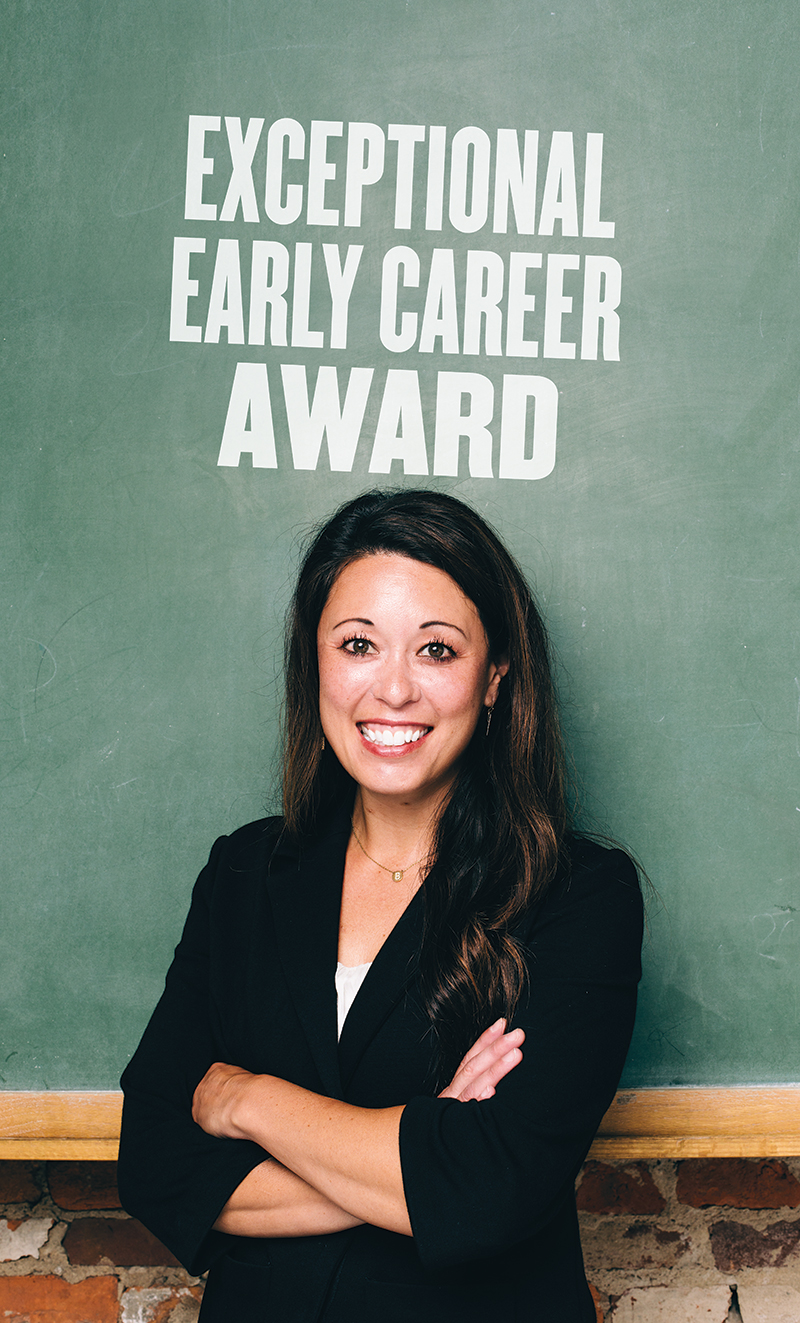
Exceptional Early Career Award
Becky Walters (NUR ’96), a nurse practitioner and a clinical associate professor of nursing, has both feet firmly entrenched in two distinct work settings. Yet her students, juniors and seniors embedded in simulated lab courses that prepare them for the life and death challenges of the nursing field, crave the real-world experience she brings to the classroom.
Walters knows their chosen path well. She earned her bachelor’s degree in nursing from Purdue in 1996, and later a master’s degree in 2004. Through two decades of work experience, she’s learned firsthand to preach about what she’s still practicing. “I think my teaching is informed by the fact that our field is so practice-based and health care changes so rapidly,” she says.
The spring announcement of her Exceptional Early Career Award arrived after a lot of hard work. Since returning to Purdue in 2011 to teach, Walters has completed about a dozen workshops offered by the Center for Instructional Excellence. “Purdue provides so many great opportunities for professional growth,” she says. “I really learned a lot about nursing education.”
Her desire to be a nurse and teacher goes back to her high school days, when she shadowed one of each in trying to help break the tie in her mind. “People in my life also said nursing would be a good fit for me,” Walters says. “I’m thrilled at having chosen that route, but even as I attended Purdue as an undergrad, part of me thought I could come back and teach nursing.”
She became a teacher a little sooner than she thought, originally thinking she might do that at the end of a nursing career. In various settings, which includes taking students into IU Health in Lafayette, Walters shares her passion for nursing with students in real-time situations. “I love the patient care and love teaching, so now I can do both,” she says. “Our school really supports faculty practice, which is also beneficial to students.”
Walters is not one to rest on accolades. She keeps on her educational path, now in pursuit of a doctoral degree.
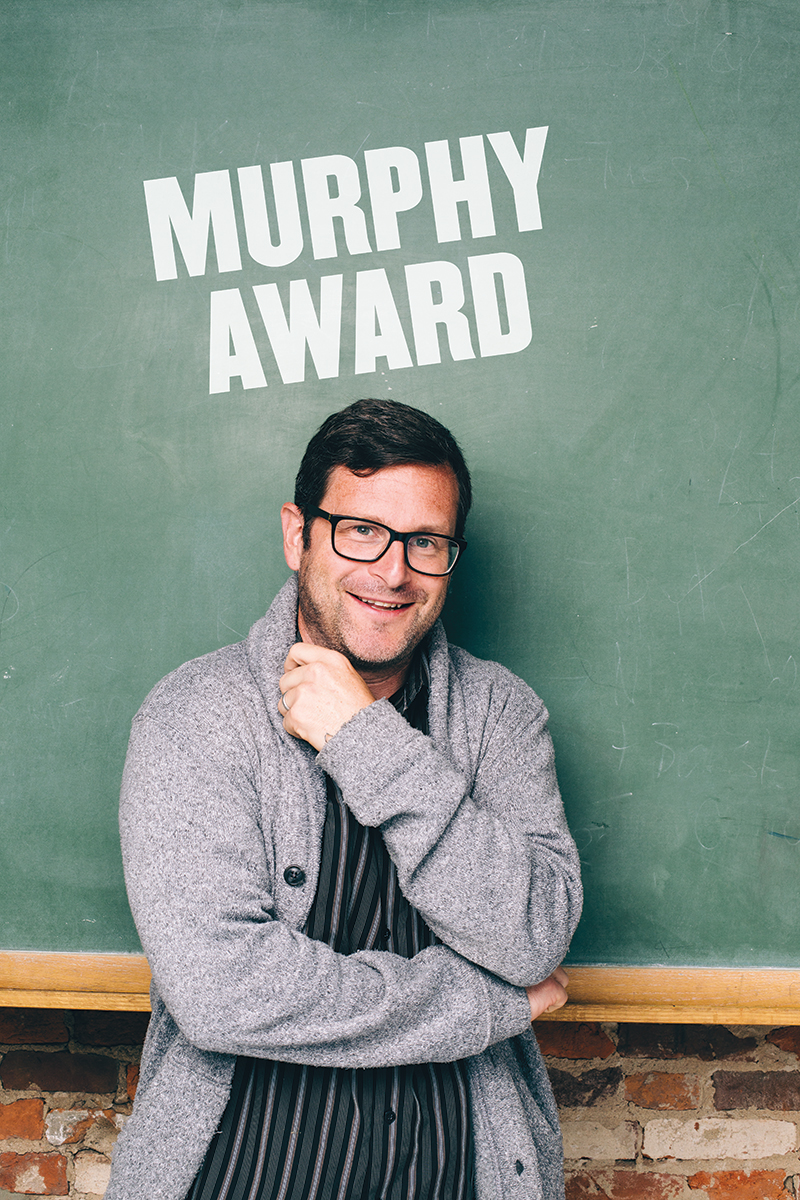
Murphy Award
For George Hollich, associate professor of psychological sciences, delivering a lecture to 400 students in an introductory psychology class is a welcome experience. Growing up in a theatrical family near Hershey, Pennsylvania, Hollich recalls one of his earliest memories as singing “The Star-Spangled Banner” at Veterans Stadium before a Philadelphia Phillies game. “I always thought it was perfectly normal as a kid to stand up in front of a group of people and have them look at you funny,” he says.
Hollich has been entertaining — and teaching — audiences big and small at Purdue since 2002. He’s brought in music to create a “festival atmosphere,” adapted certain song lyrics to fit lesson plans and effectively transformed the “sage on a stage” role into a virtual master of ceremonies.
The theatrics, however, are crafted to deliver a deeper understanding of the material. “It’s always about the relationships between the students and the professor and connecting with them,” Hollich says. “And that’s true whether you have 400 students in the class or four.”
Even as he’s been heralded for his efforts, Hollich believes a good teacher is never satisfied. “I’m always trying something new and different to see what works and what doesn’t,” he says. “Sometimes things work and it’s magical. Students are on the edge of their seats, they clap, and they’ll remember the lesson. Then there are other times where something falls flat.”
The magic happens for Hollich when he realizes his students can apply the material to something beyond an answer on a test. He hopes anyone taking his child psychology course, for example, might use that knowledge to inform their parenting — even years down the road. “So often as parents we get stressed out by things we shouldn’t get stressed out about,” he says. “I want students to remember and say, ‘Oh yes, Dr. Hollich told me this would happen.’ And then not panic.”
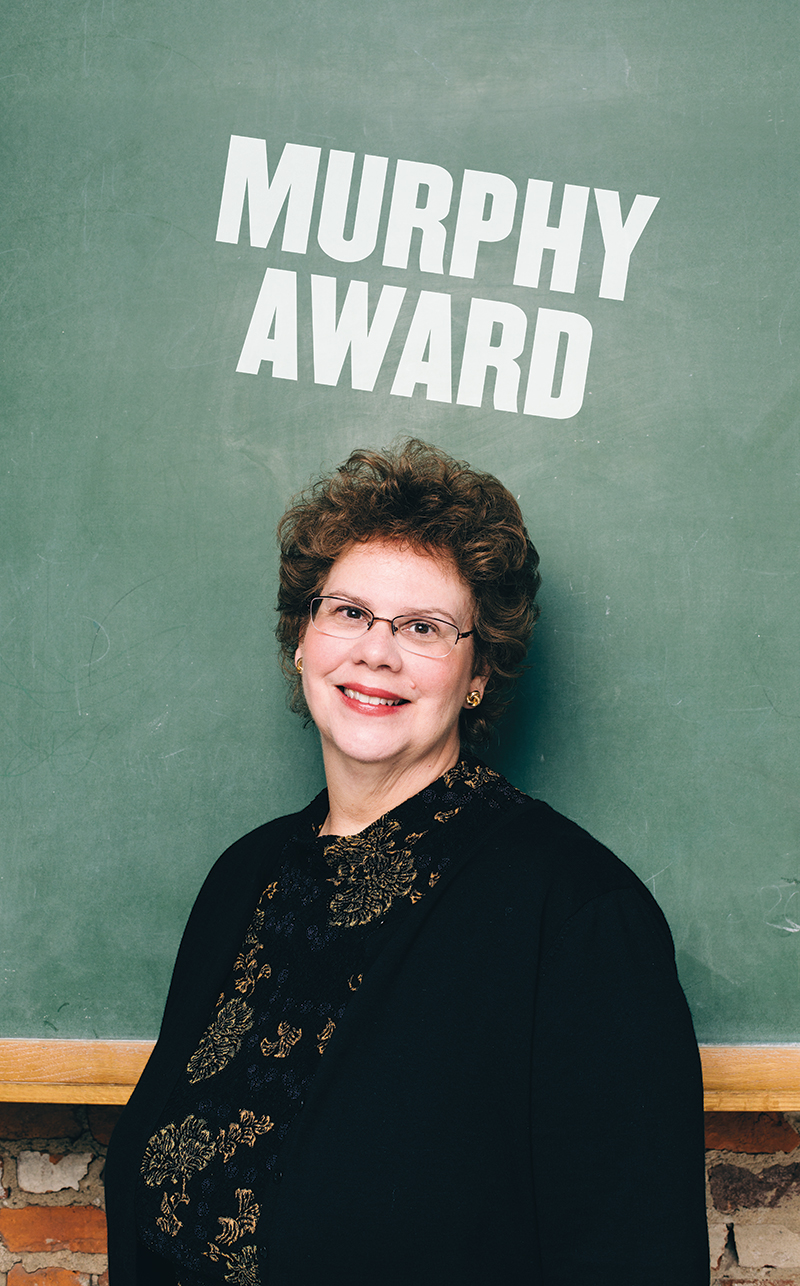
The Murphy Award is Purdue’s most prestigious award for teaching. When Karen Foli, associate professor of nursing, picked up her Murphy Award in 2015, she felt both surprised and humbled, she says: “I know there are many talented teachers at Purdue, so I was honored to be selected.”
Foli likens the route to her Purdue professorial post to a circuitous path. Beginning perhaps with a bloodline, as her father taught in the Department of Economics at Indiana State University for many years, she landed on Purdue’s campus 10 years ago. After starting her early career in nursing, Foli then became a full-time writer with a literary agent, worked on global research protocols as a regulatory writer at Eli Lilly & Co., and taught business communications at Indiana University. Foli says all those previous experiences may have fashioned a teaching philosophy. “Coming from an eclectic background and having a child with a learning difference certainly influenced my tendencies toward teaching,” she says. “I’ve always enjoyed helping people learn new information and continuing to learn myself.”
These days, most of that new information is focused on teaching at the graduate level. As the director of a newly launched PhD program, Foli says her undergraduate teaching experiences prepared her for writing a proposal for the program, as well as refining syllabi and creating guidelines.
Foli finds working with students at the pinnacle of their academic careers particularly rewarding. “My primary job, in addition to teaching, is to conduct research,” she says. “I’ve very much enjoyed teaching PhD students. I’m involved in several active studies right now, so I can share what I’m doing about the procedures, challenges and facilitators. It’s wonderful to be able to connect on a scholarly level like that.”
Regardless of a student’s level, or how much technology has changed classrooms since her days as a nursing instructor in the mid-1980s, the connections remain pretty standard. “Environmental forces have allowed me to adapt to technology, but there’s really no substitute for an authentic connection between the teacher and student,” Foli says.
More Life 360 Stories
Alumni
- Dean’s Message
- 2012-19 Campaign Initiatives
- HHS alumni score for professional sports teams
- HHS students and alumni giving back
- Who's Your Favorite Teacher?
- HHS celebrates Giant Leaps during Purdue's sesquicentennial
Faculty
- Dean’s Message
- Culinary experience transcends reality
- Our Teaching Best
- HHS Award-Winning Teachers
- Sustaining the simple joys of life
- Nursing project tackles overmedication at Indiana nursing homes
- Who's Your Favorite Teacher?
- Inaugural dean steps down, feeling pride in HHS’ strength, confidence in its future
- HHS celebrates Giant Leaps during Purdue's sesquicentennial
Milestones
- News
- 2012-19 Campaign Initiatives
- Inaugural dean steps down, feeling pride in HHS’ strength, confidence in its future
Students
- Culinary experience transcends reality
- International Success Stories
- HHS students and alumni giving back
- Who's Your Favorite Teacher?
- HHS celebrates Giant Leaps during Purdue's sesquicentennial

